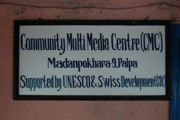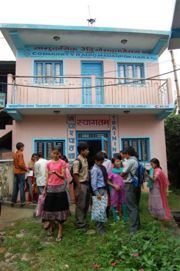Community Media/CCMW/Materials/Good practices/Hamro Pathsala
Contents
A Profile in Effective Learning Programmes: Hamro Pathsala (Our Classroom)
Summary
Hamro Pathshala (Our School) is a local distance education programme for secondary school students run by Community Radio Madanpokhara, a FM station in Mid-Western Nepal.
At the outset of the show, in August 2005, more than 75% of students in Palpa District were failing their exams due to poor scores in English, Math and Science.
Hamro Pathsala’s goal is to increase pass rates among class ten students in the national school-leaving exams. Designed through a weeklong workshop process that brought together local teachers and radio producers, the programme offers weekly tuition over the radio for students in classes 8-10.
Programme description
The total broadcast time for Hamro Pathsala is 4.5 hours per week, evenly divided among three classes: 8 through 10; and three subjects: English, Math and Science.
In its first year Hamro Pathsala broadcast 90 minutes weekly for class 8; in the second year, the timed was doubled to follow learners through class 9, and in the third year, the programme reached its full mandate with 90 minutes weekly for students in classes 8 through 10.
The programme is designed around the national curriculum so that weekly content addresses students’ academic requirements and matches local school syllabi.
Subject areas taught are revisited and tested through a monthly questionnaire; local businesses offer a small reward for the best students.
Programme Design & Delivery
Each show features a programme team consisting of a local teacher together with radio producers. The course teacher records the programme in advance with technical assistance from the radio staff, combining weekly tuition with education news and tips.
Radio staff lead each show with the signature tune and introduce the course teacher and weekly subject (2 min). The teacher shares listener letters and other feedback; reviews the previous homework assignment (3-4 min); and then covers that week’s subjects (16-18 min).
The teacher visualises learners, simulating actual learning environments; local music is added to make the flow more animated. The show’s content is reviewed and homework is assigned (3 min). Radio staff share local educational news and request feedback from listeners (2 min); followed by the signature tune and sign off (1-2 min).
Assessment and support (testing)
The show tests students once a month. Questions are posed using a questionnaire circulated among local schools; teachers are requested to assist the students in their respective classrooms and students send their responses by post; the best results are rewarded.
The programme encourages schools and parents to play a part, listening and taking up discussion and review for the monthly test questionnaire.

